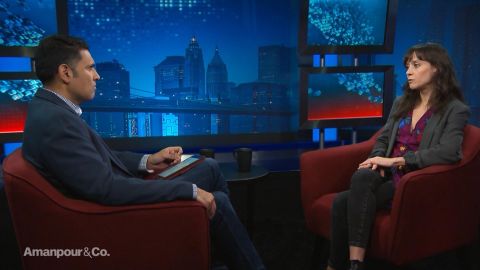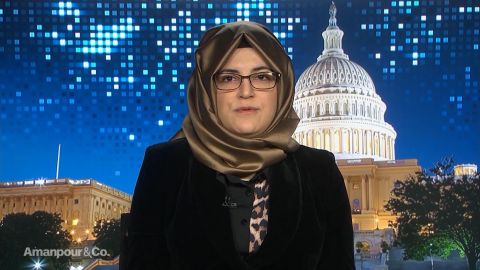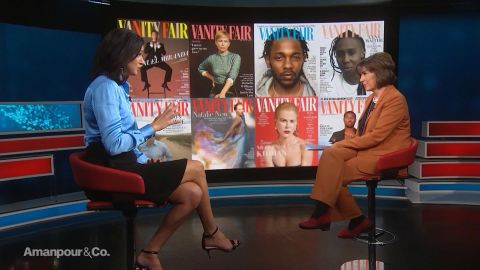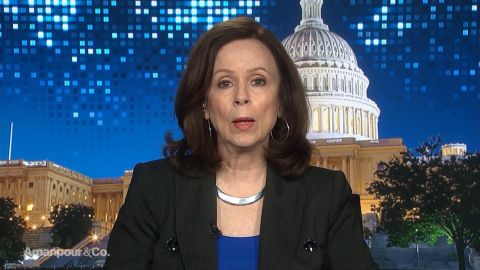Read Transcript EXPAND
CHRISTIANE AMANPOUR: Rachel Lears spent a year documenting the highs and lows of campaigning against the establishment and challenging the status quo. As so many what the freshmen did in November’s midterm elections. Knock Down the House won the Festival Favorite Award at Sundance and it became the biggest documentary sale ever brokered when Netflix paid $10 million to show it to the world on its platform. It is an intimate look at history in the making following four female insurgents, including Alexandria Ocasio-Cortez, all taking into this system. And as Lears has told our Hari Sreenivasan, it is a very personal piece of work.
HARI SREENIVASAN: What’s the story you were trying to tell?
RICHARD LEARS, DIRECTOR, “KNOCK DOWN THE HOUSE”: Well, I was really interested in telling a big story that was national in scope, about people coming together from different parts of the country, from different backgrounds, to really work together and find common ground in unexpected ways. So I knew that this organization is bringing to Congress and justice Democrats. We’re going to be recruiting candidates among ordinary working people to run together on a unified slate. And they would all be grassroots campaigns that took no corporate PAC or lobbyist funds. So I was very interested in what that would look like, both on the human level of what does it take to believe in yourself as an individual, to put yourself out there in this way. And then also what does power look like in an institutional level around the country, different political machines. And what does it look like to challenge that power from a grassroots perspective?
SREENIVASAN: I mean there seems to be kind of different through lines here. One about representation. One about money. And then really how they kind of converge in politics.
LEARS: Yes, absolutely. That is very much what I hope the takeaway will be is that you know, I think there’s an intrinsic connection between money in politics and representation in politics. When we have a campaign finance system in which it is assumed that it’s going to cost millions of dollars to run a campaign, a congressional campaign, for example. And that you have to have access to that in your personal Rolodex to be considered viable. Only certain kinds of people are going to run for Congress and run for office in general. So really, the only way to challenge that is to build a new pathway so that people from historically marginalized groups or underrepresented groups can have an alternate path to building power in the community and getting to office that way.
SREENIVASAN: You followed four different women in the film. We’ve got a clip where they’re kind of almost trying out a stump speech, just really getting confident. And they’re all kind of in the room watching each other. Take a look.
(BEGIN VIDEO CLIP)
AMY VILELA, FORMER HOUSE CANDIDATE: You know I grew up in poverty. I was raised by a single mother. And so I learned how to fight early on. Now that my eyes are open, I cannot and I will not close them again.
CORI BUSH, FORMER HOUSE CANDIDATE: The person I’m running against is complacent but I’m not. I myself can deescalate a person with a gun. And I’m not a police officer. So I wonder how come they can’t do it?
REP. ALEXANDRIA OCASIO-CORTEZ: I’m running because of Cori Bush. I’m running because of Paula Jean Swearengin. I’m running because every day Americans deserve to be represented by everyday Americans.
PAULA JEAN SWEARENGIN, FORMER HOUSE CANDIDATE: And it’s time for ordinary people to do extraordinary things. Let’s raise some hell and take our lives back. Thank you.
(END VIDEO CLIP)
SREENIVASAN: A lot of people are going to be introduced to the idea that there is this infrastructure in place that it had been working in the previous Congress, and it still exists now. What is it about? I mean the new Congress, the Brand New Congress, and the Justice Democrats, what were they trying to do?
LEARS: Right. So those groups were actually founded in 2016. And those – – by organizers that had come out of the distributed organizing wing of the Bernie Sanders campaign. So they had a lot of experience connecting just thousands of volunteers around the country to do voter contact, peer to peer voter contact through phone calls, text messages, et cetera. And so their idea was to really find candidates around the country who would come from the communities they sought to represent. And really, to have those twin goals of getting big money out of Congress while increasing representation in it. And the whole concept was that by being a national slate is candidates would support one another through the process because it is very difficult. Many of them were first-time candidates. But also, that they would be able to activate national networks of volunteers to do some of the phone banking and text messaging and as well as the small dollar donations.
SREENIVASAN: Is there anything happening on the Republican side?
LEARS: Well, Brand New Congress is actually is a bipartisan organization. They were recruiting and still are recruiting candidates to be on the slate from the Republican side as well.
SREENIVASAN: And when you look at the space, all of these people came with their own very personal reasons for why they decided to do this to themselves, right? Tell us about the four candidates that you’ve profiled and why they came into this.
LEARS: Yes. So each of the candidates we’ve profiled has a very personal high stakes reason for getting involved with politics and for running for office in the first place. And so the film follows Alexandria Ocasio-Cortez, who is motivated really by the experience of growing up between two worlds in the Bronx and Westchester, New York, really seeing firsthand the facts of economic inequality and the differential opportunities that you have, based on the zip code where you grew up. And in particular, her family suffered a great deal during financial crisis of 2008. She lost her father who was the main breadwinner at the time. And that’s when she herself became involved in the hospitality industry just to keep the family afloat and to keep their home. So she really understands in that first-hand level what economic inequality feels like. And then we followed Paula Jean Swearengin in West Virginia who comes from a family of coal miners. Just about every man in her family has been a coal miner, fathers, uncles, grandfathers. And many of them have suffered and died from illnesses related to the fossil fuel industry, black lung cancer.
So she sees those effects, the health effects and as well as the environmental degradation that’s happening and she is really motivated by the desire to challenge, the false choice between a clean environment, clean water to drink, and good jobs. She would argue that all West Virginians and all Americans deserve both. We also worked with Cori Bush who is a nurse and a pastor near Ferguson in St. Louis, Missouri. And she became a frontline Ferguson activist in 2014 around the death of Michael Brown who was shot by a police officer.
And through that community organizing, she began to feel that the elected officials in her community were not as responsive as they could be to the community’s needs. So she really stepped out to try to be an alternative there. And finally, we followed Amy Vilela who ran in Las Vegas, Nevada. And she had not been involved in politics at all in her life until, in 2015, her 22-year-old daughter was unable to receive treatment at a hospital. Amy believes due to the fact that she wasn’t able to present proof of insurance.
So the insurance system got in the way of her care. And as a result, she suffered a pulmonary embolism. Her blood clot was not diagnosed and she died at the age of 22 in the richest country in the world. So Amy became politicized around the issue of universal health care and single-payer health care in particular.
SREENIVASAN: And we’ve got a clip of Amy I just want to take a look at too.
(BEGIN VIDEO CLIP)
VILELA: My name is Amy. And I am not a career politician. I was someone who should not be able to run for Congress. I was a single mom, I was on Medicaid, wick, food stamps. I worked my way through college somehow and became a chief financial officer. Thanks a lot.
UNIDENTIFIED FEMALE: Take care.
VILELA: This is not a game to me. This is not an opportunistic move for me. I turned my back on an executive level job. I sold my house. I’ve gone into debt. In the beginning, it was a tough decision. But I would do it again in a heartbeat now.
(END VIDEO CLIP)
SREENIVASAN: She put everything on the line. And three out of four of the people that you profiled did not win their elections. Were you as a filmmaker ready for all four of them to lose? Because Alexandria Ocasio- Cortez pulled off an amazing offset. She was not expected to win that day.
LEARS: That’s right. We were very prepared for all four of these candidates to lose. That was part of the reason that we chose people who had very strong personalities and a charismatic on-screen presence and their very personal stories that were motivating them. We knew that we needed those things to really carry the film forward with an uncertain outcome. But we were also very interested in looking at races that would allow us to explore the nature of power in this country. Really looking at what political machines look like in different parts of the country.
We’re thrilled, of course, that it includes this historic victory. But I think that a lot of the substance of the film was consistent throughout the process from development through to execution. And I think we made sure to include the races in which the candidates don’t win as part of that conversation. So we want to offer audiences a bit of hope but also realistic expectations about how hard it is to do this kind of thing, to have a really nuanced conversation about what these times of grassroots campaigns look like.
SREENIVASAN: There’s an interesting bit where Amy, the character who we just watched after she loses, she gets the support of a phone call from Alexandria Ocasio-Cortez. She said it might have to take 100 of us —
LEARS: For one of us to make it through, a hundred of us have to try.
(BEGIN VIDEO CLIP)
VILELA: Some of us are going to get through. It’s about the whole movement.
OCASIO-CORTEZ: For one of us to make it through, a hundred of us have to try.
(END VIDEO CLIP)
SREENIVASAN: There’s — the inverse of that is also you showed that political power and machine and the interconnectedness of the money when you realize that Joe Crawley, Alexandria Ocasio-Cortez’ opponent [13:50:00] here is making donations to races in different places around the country.
LEARS: Sure. I mean established politicians often donate to — if they raise more money than they need for their own race, they frequently support one another. And so certainly, when you have an open seat like the seat in Nevada’s fourth district, Amy was actually running against the incumbent and then dropped out because of Me Too allegations and it became an open seat. A lot of other folks jumped into the ring at that point. But most of the networks of power, both locally and nationally, got behind one opponent, Steven Horsford. So Joseph Crowley, who was known in the party as a big fundraiser, he didn’t run.
As noted in the film, he hasn’t had a primary challenger in 14 years and never had a serious challenge. It’s an 88 percent Democratic district. So the money he raised around, generally around $3 million a cycle, he dispersed to other races around the country. And in this case, Steven Horsford was one of the races he chose to support.
SREENIVASAN: Because Amy Vilela’s race was almost a little bit of a bellwether of this if we can kind of suppress or tamp down the opposition, it is better for this race in New York.
LEARS: It may have been. That was the interpretation of her staff at the time. I have, of course, no idea what exactly the strategy was. It was also a swing district. And so I think Crowley was also supporting the Triple C-endorsed candidates of a lot of swing districts.
SREENIVASAN: Did any of the incumbents sit down or agree to an interview?
LEARS: They did not. We did try hard to get all of them and none of them was willing to speak with us.
SREENIVASAN: This is not just a film for Democrats.
LEARS: Absolutely not. It’s very much — there is no Democrat versus Republican race that we cover in the film. And all four are Democratic primary contests. And so the film is really about the relationship among money, party politics, and social movements. And money and politics is a nonpartisan issue. The issue of representation, of regular working people in Congress is a nonpartisan issue. We’ve had some great responses from Conservatives who have seen the film at Sundance or voiced their opinions on Twitter, for example. Just that you know, even if they don’t agree with the political positions that the candidates take, they respect the hustle and the work, and the goal of increasing representation in our democracy. So we hope that people can engage with it no matter where they are on the spectrum.
SREENIVASAN: Regardless of whether they’re Democrat or Republican, what do you hope a potential candidate watching this film walks away with?
LEARS: Well, I hope people who watch the film feel compelled to engage whatever their capacity is. Whether it is voting. I’ve seen a lot of people tweeting like, oh, wow, I’m going to make sure I vote now after this. And if someone feels called to run for office, we’ve also seen a lot of people feeling inspired after the film to do that. I hope it gives people the sense that it is worth trying. It’s going to be hard but that building networks of support in your community, and among other candidates, is really going to be a crucial part of that process if you’re a first-time candidate.
SREENIVASAN: Most of America knows what happened to Alexandria Ocasio-Cortez after the election night. The other three women, you’ve stayed in touch with them. Where are they now? What are their plans?
LEARS: Yes. So I’ve stayed in touch with all four subjects of the film. Cori Bush has already declared that she’s running again in Missouri’s first district. Her volunteers actually never stopped campaigning for her. She took a bit of a break after last year’s election but they continued organizing. So she’s going to have the ring again. Paula Jean Swearingen in West Virginia has said that she’s running again but she’s still weighing her options around a few different races. And Amy Vilela is writing a book about her life experience. There are a lot of details that didn’t make it into the film, of all of the stories but I think in a lot of ways, Amy’s in particular. And so she’s writing a broader story of her life, as well as she’s considering running again but aiming right now towards 2022. And she might be spending the cycle supporting other candidates.
SREENIVASAN: Thanks so much for joining us.
LEARS: Thank you so much. I really appreciate it.
About This Episode EXPAND
Christiane Amanpour speaks with writer Robin Wright about the troubling state of U.S. foreign diplomacy; Hatice Cengiz about her late fiancé, Jamal Khashoggi; and editor-in-chief of Vanity Fair Radhika Jones about her first year at the magazine. Hari Sreenivasan speaks with filmmaker Rachel Lears about her film “Knock Down the House.”
LEARN MORE



